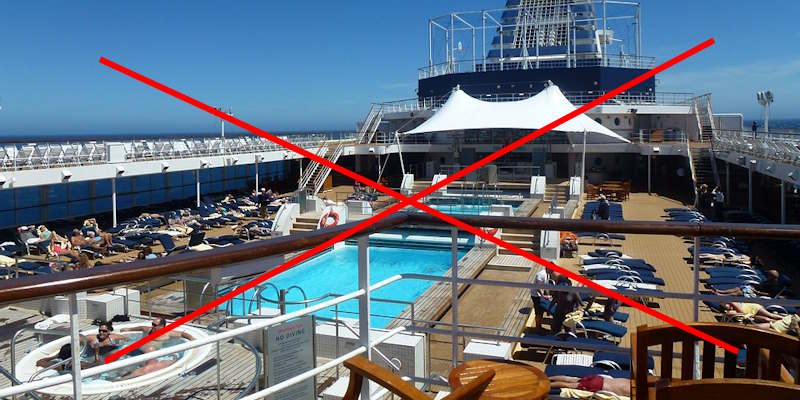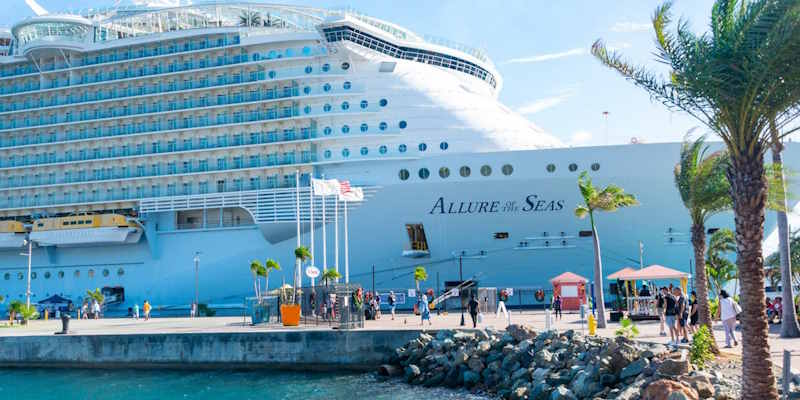Think cruise ship jobs are glamorous? Picture this: 12-hour days with no weekends, sleeping in cabins so small you can’t stretch your arms, and missing your child’s first steps because you’re halfway across the world. Behind the luxury of five-star dining and turquoise waters lies a hidden reality for the crew—a life of relentless work, emotional sacrifice, and isolation.
While passengers sip cocktails on deck, the crew is scrubbing floors, rushing up ten flights of stairs at 3 a.m., or catering to passengers’ every whim. As one crew member put it, ‘By week four, you forget what a weekend feels like.’ Welcome to the dark side of cruise life. Are you ready to step behind the curtain?
When I started digging into cruise forum posts and speaking directly to crew members, I uncovered stories that shocked me. The glitz and glamor hide a grueling lifestyle few would envy. Here’s a raw and unfiltered look at what life is really like for those working below deck.
The Cons of Working on a Cruise Ship

Life at sea isn’t all sunsets and sandy shores. Behind the glamor of exotic ports lies a tough reality: 12-hour shifts, shoebox-sized cabins, and constant pressure to perform. Curious what really happens below deck? Let’s dive into the untold stories of cruise ship life.
Long hours and few days off
Twelve-hour shifts, seven days a week, for months on end—this is the reality of cruise life. For cruise workers, the work never stops, and downtime is a rare luxury, especially on sea days. One worker commented, “By week four, you forget what a weekend feels like.”
Sea days are the toughest. One staff member mentioned, “You’re on your feet all day, catering to passengers’ every whim. Sometimes, it feels like you’re running on empty.” Rest? That’s for the next contract break.
Lack of personal time
You can basically forget any personal time because you’re on call 24/7. When an announcement goes out, you must get to your emergency station. It doesn’t matter if it’s 3 a.m., you’re in the shower, or you’re enjoying shenanigans with another crew member. You’d better “down tools” and respond immediately.
A cabin attendant told me, “Once, I was woken four times between 2 and 5 a.m. and had to run the length of the ship and up ten decks. After that, I had to get on with my regular work the next day.”
Limited living space and lack of privacy

Crew cabins are small—I mean, tiny. If you thought some interior passenger cabins were small, wait until you see where the crew lives. One crew member told me, “It’s like living in a shoebox with a roommate. You must quickly get used to shared bathrooms, bunk beds, snoring, phone calls, and other noises.”
You can forget about working on a cruise ship if you’re claustrophobic. Cabins are cramped and tucked along narrow corridors well below the waterline. Of course, you’ll be so shattered after a shift that it may not bother you. But as one crew member said, “Staff living quarters are not for the faint-hearted.”
Emotional challenges and homesickness

Being away from loved ones for months at a time takes its toll. “I missed my kid’s first steps while I was at sea,” one crew member recalled. Celebrating holidays, birthdays, and life events over a video call—when the internet works—can feel isolating.
The job’s intensity amplifies loneliness. “After a long shift, all you want is someone familiar to talk to, but they’re thousands of miles away, and internet connections are so expensive—even for crew.”
For many, homesickness is the most brutal wave to ride while working at sea.
Physical strain and health issues

Working on a cruise ship demands good physical stamina. It’s easy for cabin attendants to walk seven or eight miles daily. Not to mention lifting heavy luggage, making beds, and cleaning up after messy guests.
Additionally, staff members must work extra during holidays. My cabin steward showed me a picture of her as an elf last Christmas. This was on top of her regular duties. As one person commented online, “If you’re not used to physical work, your first contract will test your limits.”
Also, some staff never find their sea legs, and bouts of seasickness are common. For them, being on constant medication for the length of their contract is their worst nightmare.
Balancing social dynamics

Here’s an interesting fact I never knew: crew from over 75 nationalities can be working on a cruise ship at any given time. Of course, working with a multicultural crew can be rewarding—but also challenging. As one worker said, “Friendships form fast, but so do tensions, especially when you’re with the same people 24/7—there’s no escape.”
Balancing diverse personalities and cultural norms requires patience, diplomacy, and a good sense of humor to keep the peace onboard. One staff member gave good advice, “Cultural misunderstandings are common, but they’re great learning opportunities if you approach them with patience.”
Highly regulated way of life
Everything on board must run “ship-shape.” And for some, the regulated lifestyle with its hierarchy can feel restrictive. Restaurant staff told me, “Drills and inspections are constant—it’s all about safety, but it can feel like every minute of your day is planned.”
I was surprised to learn that cruise staff (front of house) have a dress code for everything. And don’t even think about going to work and leaving your bed unmade. A cruise worker told me, “Cabins are inspected regularly, and if there’s a mess, our supervisors are notified. For too many infringements, you can expect to receive a written warning.”
Limited internet and connection with the “outside” world

Unfortunately, WiFi is just as slow, expensive, and unstable for the crew as it is for passengers. My cabin attendant told me, “I usually rely on free WiFi in ports to call home. But keeping up with family, friends, or even world news becomes challenging when your connection fades at sea. Sometimes, I feel isolated.”
Upfront costs for documentation and shoes
I was shocked to learn that first-time cruise workers must shell out a small fortune before they begin working onboard. This includes pre-employment medical checks, background checks, visas, and appropriate uniform shoes. At least major cruise lines provide uniforms for staff.
Difficult to maintain relationships

A common complaint from many cruise ship staff is that long-distance relationships are tough. Contracts typically last between six and 12 months, meaning little quality time to build and maintain relationships. Also, months away at sea strain even the strongest connections.
One cruise worker lamented, “You come back and realize life went on without you, and it’s a shame when friendships fade.” Unfortunately, maintaining relationships is tough, and making emotional sacrifices is a hard reality of cruise life.
Constant high customer service expectations

Like most service industries, the customer is always right—even when they’re not. Most cruise workers cite the pressure to deliver five-star service 24/7 as emotionally draining. One cruise worker said, “Guests expect you to be their personal concierge, entertainer, and problem-solver all at once. One passenger got annoyed when I couldn’t get their mobile phone working.”
Balancing constant requests with tight schedules requires patience, stamina, and an unshakable smile, no matter how exhausting the day gets. Unfortunately, staff must deal with rude guests on every voyage.
No access to passenger amenities

Did you know that cruise ship amenities like the pool, spa, and gourmet restaurants are strictly off-limits to crew? One staff member lamented, “The spa and pool are maybe just a deck away, but they might as well be miles. Passengers relax in luxury, but we cannot dip our toes in the pool.”
I’ve read on forums that there’s a stark contrast between facilities for crew and passengers. So, even downtime can feel restrictive. A cabin attendant told me, “Our recreation area is small and basic. It’s a constant reminder of the divide when you’re cleaning cabins and passengers are lounging in the hot tub.”
Medical care limitations
While ships have onboard medical staff, the care has its limits. One crew member told me, “They’re great for minor injuries, but anything serious means disembarking.” This often means extra costs and time lost if treatment isn’t available onboard.
Basically, cruise lines don’t like any staff member with chronic conditions that cannot be fixed on board. While the free medical care for minor illnesses and medical conditions is reassuring, its limited scope can leave crew members feeling vulnerable in serious emergencies.
The Pros of Working on a Cruise Ship

Working on a cruise ship offers plenty of perks, but it’s not all smooth sailing. Let’s dive into what makes this lifestyle so unique and appealing—while keeping things real.
Travel the world for free

Traveling the world is one of the biggest perks of cruise ship life. One crew member shared, “I’ve visited over 35 countries, been on more Caribbean beaches than I can count, and sailing through the Arctic Circle was a dream come true.”
Sounds incredible, right? But let’s be clear—while you’ll wake up in a new country every few days, your free time at ports might be limited depending on your role and schedule. Still, it’s a lifestyle that offers endless opportunities for exploration and adventure.
While the pay won’t make you rich, the perks? Totally worth it! Imagine waking up in a new country every few days, with no rent, no grocery bills, and no commuting. It’s not just a job—it’s a lifestyle.
What About the Pay?
Sure, cruise ship salaries aren’t sky-high:
- Carnival Cruise Line: $17,000 per year
- Royal Caribbean Group: $19,400 per year
- Norwegian Cruise Line Holdings: $20,100 per year
But here’s the catch—you’re not paying for housing, utilities, or meals. That means most of your paycheck can go straight to savings or adventures at port. As one crew member put it, “I’ve been to over 35 countries and countless beaches, and I’m getting paid for it!”
Living expense-free: a path to saving and financial freedom
No rent, no grocery bills, no utility payments. For many, this setup makes saving money a lot easier. One crew member shared, “I saved more in one contract than years at my desk job.” While that’s possible, it’s not guaranteed. Tips can supplement income, but expenses in ports and optional crew activities can add up.
The real perk? The basics are covered, and even the crew bar offers drinks at a fraction of passenger prices. It’s a chance to live simply and focus on your financial goals—if you’re disciplined.
While covered expenses make saving easier, it’s not a financial goldmine. Instead, it’s a unique opportunity to earn while exploring the world and, for many, a stepping stone to achieving personal or financial goals over time.
Live in a multicultural community

Sharing a cabin or working alongside people from different countries leads to incredible cultural exchanges. One crew member said, “I learned all about adobo from my Filipino cabinmate. While I couldn’t cook it onboard, the shared meals and stories made me feel connected to a global family.”
Late-night conversations in multiple languages and bonding over shared experiences create friendships that span continents. “I have friends on every continent now,” another shared. This diversity broadens horizons and builds lifelong connections.
Professional and personal growth

Life on a cruise ship pushes you out of your comfort zone. You’ll learn adaptability, teamwork, and problem-solving—skills that transfer to any job on land.
One crew member reflected, “The challenges I initially faced helped build resilience. I came onboard shy and left confident.” It’s a fast-paced environment that fosters camaraderie and personal growth, making it more than just a job.
Unique social life

I’ve heard that strong friendships develop among cruise ship crew and staff. For many crew members, life onboard means friendships like no other. One engineer commented, “I worked on a cruise ship for three years; it was some of the best fun I ever had. The social life was enough to keep you going despite the long hours.”
Cruise ship staff tend to hang out at the crew bar, and a cabin attendant told me that the social scene is always buzzing. One crew member remarked, “It’s the kind of camaraderie you could never find in a regular job.”
Adventure and novelty of living at sea

Let’s face it—there’s something uniquely appealing about life at sea. For many staff members and crew, every day is a new adventure. I was chatting with a restaurant server, and they said, “I love waking up every day in a new port. Time ashore could be lounging on secluded beaches or exploring bustling cities.”
The opportunities for adventure can be incredible, but they often depend on your role and schedule. Crew members in demanding positions may have limited time to explore ports, while others might get to enjoy more shore leave.
Access to onboard medical staff

For minor illnesses or injuries, cruise ship crew and staff have access to onboard medical facilities. “I got sick during my first contract, but I received an exam and antibiotics at no cost,” shared one crew member. While serious medical issues may require disembarkation for treatment, the availability of basic care gives crew members peace of mind.
Up to eight-week vacations between contracts

Six to eight weeks off between contracts sounds like a dream, right? While it’s unpaid leave, many crew members appreciate the downtime to recharge. “I rarely touch my paycheck, so I’ve always got plenty of money to do what I want during my time off,” said one chef. This extended break gives you the chance to relax or explore on your own terms.
Reflections on the Lifestyle of Cruise Ship Workers

Summing up, cruise ship jobs are a unique experience with rewards and challenges. For some, traveling to exotic destinations, the close-knit community, and potential savings make it the perfect adventure. But for others, the long hours, lack of privacy, and emotional sacrifices take their toll.
Knowing what life’s really like behind the scenes can flip your perspective. Behind every cocktail poured, bed made, or smile flashed is someone working grueling hours, far from home. “Even a simple thank you feels huge,” one crew member said. A little patience, a kind word—it’s not much to ask. And for the crew, it means everything.
Related articles:

